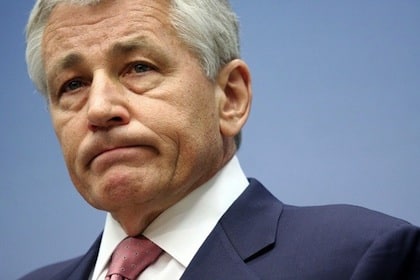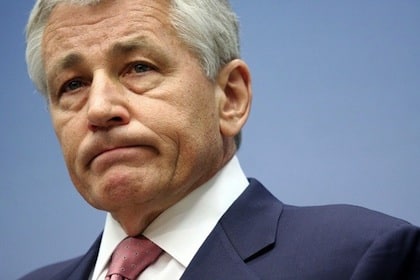
Washington is abuzz with news that Chuck Hagel is out as President Obama’s Secretary of Defense. The Secretary was said to have never meshed with the rest of Obama’s foreign policy team, led by National Security Advisor Susan Rice and flanked by US Ambassador to the UN Samantha Power and others. Differences over how to handle the rapidly-escalating US war in Syria and Iraq are said to be the breaking point.
The president’s closest national security advisors embrace a policy of worldwide US intervention — often dubbed “humanitarian” — while micro-managing the Pentagon’s means to achieve the demanded objectives. Indeed, Hagel, a two-time recipient of the Purple Heart as a combat veteran in Vietnam, found himself and the Pentagon’s top military leaders at odds with the president’s national security advisors, who were enthusiastic about the use of US force abroad but possessed virtually no military experience themselves.
The Obama team’s track record on “humanitarian” interventions (Libya, Iraq III) and regime change operations (Ukraine, Syria, South Sudan, Egypt, Tunisia, etc) has been one of failure. The political objectives have often been devoid of a workable military strategy. For example, when the president tried to convince the American people last year of the importance of bombing Syria to affect regime change, his secretary of state, John Kerry, did his best to minimize the military component of that incredibly ambitious objective. The 2013 planned US attack on Syria would be an “unbelievably small, limited kind of effort,” said Kerry at the time.
Wisdom of regime change aside, the military likely knew it was being hung out to dry — tasked with an enormous objective and told it must use “unbelievably small” tools to get the job done.
The president’s new war in Iraq and Syria started the same way, with a promise of an extremely limited humanitarian operation to rescue a small religious minority in northern Iraq. The mission rapidly expanded into a major military operation involving hundreds of bombing runs, thousands of US troops, and billions of dollars. With no end in sight.
Hagel’s fate was most certainly sealed early in October, when it was reported that he sent a memo to Rice expressing concern over the Administration’s Syria policy. US policy particularly toward Syrian leader Bashar Assad had been incomprehensible. Unable to back down from the humanitarian interventionists’ demands that “Assad must go,” the administration simply pretended that Assad — and his army on the ground fighting al-Qaeda and ISIS — did not exist. Instead, the policy appeared to be one of fighting ISIS and ISIS’s enemy — Assad — at the same time, all the while training yet another tranche of “moderate” rebels who would presumably fight both ISIS and Assad.
Hagel’s memo prompted what was reported as a review of US policy toward Syria in November. For political reasons, the administration must keep the appearance of a broad coalition united to defeat ISIS. Key players in that coalition — Turkey, Saudi Arabia, Qatar, Jordan — and less visible but equally vocal anti-Assad players like Israel, have demanded that Assad’s ouster be given primacy over defeat of ISIS. US strategy post-review was said to have shifted from defeating ISIS in Iraq first, to a new focus on Syria.
That means Assad can no longer remain invisible to the US.
However, the emerging US position on Assad is no more comprehensible than the most recent policy of pretending he isn’t there. The rise of ISIS in Syria was all his fault, contends the US Administration.
Said Alistair Baskey, National Security Council spokesman this month:
Assad has been the biggest magnet for extremism in Syria, and the President has made clear that Assad has lost all legitimacy to govern. Alongside our efforts to isolate and sanction the Assad regime, we are working with our allies to strengthen the moderate opposition …
If Assad is a magnet for extremism in Syria, it is only because Saudi Arabia, Qatar, Jordan, and Turkey have, with US and Israeli participation, spent billions training and equipping extremists to overthrow the Assad government.
The Pentagon is trapped by the impossibility of achieving the contradictory demands of Obama’s violent dreamers.
Assad will likely find himself again in the crosshairs. The US is going to hit Russia on two fronts: more overt military support for the anti-Russia regime in Ukraine and an assault on Russia-ally Assad in Syria.
Big changes coming.


